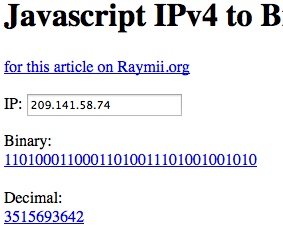Raymii.org

אֶשָּׂא עֵינַי אֶל־הֶהָרִים מֵאַיִן יָבֹא עֶזְרִֽי׃Home | About | All pages | Cluster Status | RSS Feed
IPv4 Address Conversion Tricks
Published: 01-09-2013 | Author: Remy van Elst | Text only version of this article
❗ This post is over thirteen years old. It may no longer be up to date. Opinions may have changed.
Table of Contents
Theory
Did you know that http://3515693643/ is a valid link? Why? Because this is the
decimal form of the binary IP address. Normally we represent IP addresses as
10.0.0.1, 4 blocks of numbers. Those numbers are actually binary octets
represented in decimal, therefore they can never be more than 255. If we take
the whole binary number of all blocks, and convert that to base 10, we get a
result like above, which in turn is a working network address.
This "feature" is documented in the inet_aton(3) manpage.
I've written a little javascript based converter so you can try it out yourself.
Example
Take the IP address 209.141.58.75. As a binary octets that would be:
1101000.11000110.10011101.001001011. That whole number (without the dots),
converted back to decimal in turn is: 3515693643.
And, that is a working network address:
$ ping 3515693643
PING 3515693643 (209.141.58.75): 56 data bytes
64 bytes from 209.141.58.75: icmp_seq=0 ttl=47 time=180.208 ms
64 bytes from 209.141.58.75: icmp_seq=1 ttl=47 time=197.890 ms
